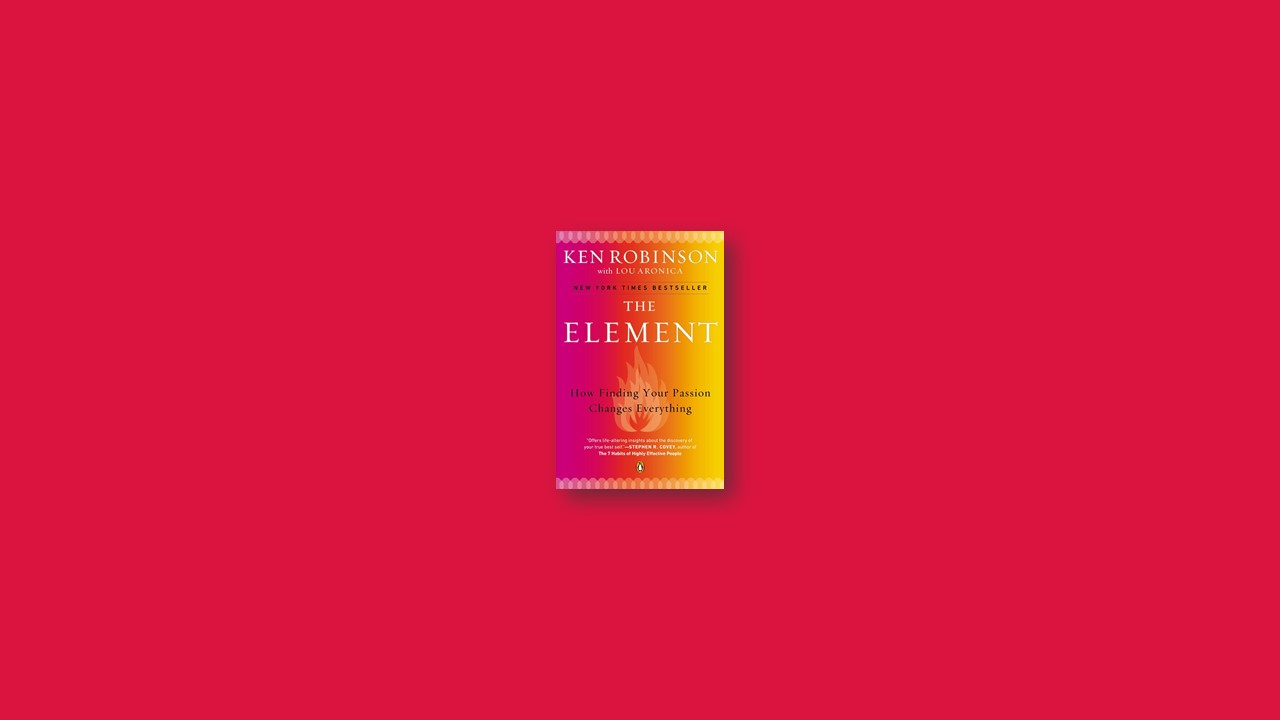What Is the Element?
The Element is the meeting point between natural aptitude and personal passion. What you’ll find in common among the people doing the thing they love, and in doing it they feel like their most authentic selves find that time passes differently and that they are more alive, more centered, and more vibrant than at any other times.
How do we find the Element in ourselves and in others? There isn’t a rigid formula. The Element is different for everyone. In fact, that’s the point. We aren’t limited to one Element, by the way. Some people may feel a similar passion for one or more activities and may be equally good at them. Others may have a singular passion and aptitude that fulfills them far more than anything else does. There’s no rule about this. But there are, so to speak, elements of the Element that provide a framework for thinking about this and knowing what to look for and what to do.
I Get It
An aptitude is a natural facility for something. It is an intuitive feel or a grasp of what that thing is, how it works, and how to use it.
Our aptitudes are highly personal. They may be for general types of activity, like math, music, sport, poetry, or political theory. They can also be highly specific—not music in general, but jazz or rap. Not wind instruments in general, but the flute. Not science, but biochemistry. Not track and field, but the long jump.
I Love It
Being in your Element is not only a question of natural aptitude. I know many people who are naturally very good at something, but don’t feel that it’s their life’s calling. Being in your Element needs something more—passion. People who are in their Element take a deep delight and pleasure in what they do.
I Want It
Attitude is our personal perspective on our selves and our circumstances—our angle on things, our disposition, and emotional point of view. Many things affect our attitudes, including our basic character, our spirit, our sense of self-worth, the perceptions of those around us, and their expectations of us. An interesting indicator of our basic attitude is how we think of the role of luck in our lives.
People who love what they do often describe themselves as lucky. People who think they’re not successful in their lives often say they’ve been unlucky. Accidents and randomness play some part in everybody’s lives. But there’s more to luck than pure chance. High achievers often share similar attitudes, such as perseverance, self-belief, optimism, ambition, and frustration. How we perceive our circumstances and how we create and take opportunities depends largely on what we expect of ourselves.
Where Is It?
Aptitudes don’t necessarily become obvious unless there are opportunities to use them. The implication, of course, is that we may never discover our true Element. A lot depends on the opportunities we have, on the opportunities we create, and how and if we take them.
Being in your Element often means being connected with other people who share the same passions and have a common sense of commitment. In practice, this means actively seeking opportunities to explore your aptitude in different fields.
Often we need other people to help us recognize our real talents. Often we can help other people to discover theirs.
Think Differently
One of the key principles of the Element is that we need to challenge what we take for granted about our abilities and the abilities of other people. This isn’t as easy as one might imagine. Part of the problem with identifying the things we take for granted is that we don’t know what they are because we take them for granted in the first place. They become basic assumptions that we don’t question, part of the fabric of our logic. We don’t question them because we see them as fundamental, as an integral part of our lives. Like air. Or gravity. Or Oprah.
Beyond Imagining
One myth is that only special people are creative. This is not true. Everyone is born with tremendous capacities for creativity. The trick is to develop these capacities. Creativity is very much like literacy. We take it for granted that nearly everybody can learn to read and write. If a person can’t read or write, you don’t assume that this person is incapable of it, just that he or she hasn’t learned how to do it. The same is true of creativity. When people say they’re not creative, it’s often because they don’t know what’s involved or how creativity works in practice.
Another myth is that creativity is about special activities. It’s about “creative domains” like the arts, design, or advertising. These often do involve a high level of creativity. But so can science, math, engineering, running a business, being an athlete, or getting in or out of a relationship. The fact is you can be creative at anything at all—anything that involves your intelligence.
The third myth is that people are either creative or they’re not. This myth suggests that creativity, like IQ, is an allegedly fixed trait, like eye color, and that you can’t do much about it. In truth, it’s entirely possible to become more creative in your work and in your life. The first critical step is for you to understand the intimate relationship between creativity and intelligence. This is one of the surest paths to finding the Element, and it involves stepping back to examine a fundamental feature of all human intelligence—our unique powers of imagination.
In the Zone
To be in the zone is to be in the deep heart of the Element. Doing what we love can involve all sorts of activities that are essential to the Element but are not the essence of it—things like studying, organizing, arranging, limbering up, etc. And even when we’re doing the thing we love, there can be frustrations, disappointments, and times when it simply doesn’t work or come together. But when it does, it transforms our experience of the Element. We become focused and intent. We live in the moment. We become lost in the experience and perform at our peak. Our breathing changes, our minds merge with our bodies, and we feel ourselves drawn effortlessly into to the heart of the Element.
Doing the thing you love to do is no guarantee that you’ll be in the zone every time. Sometimes the mood isn’t right, the time is wrong, and the ideas just don’t flow. Some people develop their own personal rituals and for getting to the zone. They don’t always work.
Different people find the zone in different ways. For some it comes through intense physical activity, through physically demanding sports, through risk, competition, and maybe a sense of danger. For others it may come through activities that seem physically passive, through writing, painting, math, meditation, and other modes of intense contemplation. As I said earlier, we don’t only get one Element apiece, nor is there only one road for each of us to the zone. We may have different experiences of it in our lives.
What Will They Think?
You’ve probably seen images of huge schools of fish swimming in tight formation that instantly move in a new direction like a single organism. Perhaps you’ve seen swarms of insects crossing the sky that spontaneously swoop and swirl like an orchestrated cloud. It’s an impressive display that seems like controlled and intelligent behavior. But the individual herrings or mosquitoes are not acting on free will, as we think of it in humans. We don’t know what may be on their minds as they go along with the crowd, but we do know that when they do it, they act almost as a single creature. Researchers are now understanding more about how this happens.
The probability is that fish make those dramatic tight shifts in direction by following the movements of the fish that lie directly in their field of perception. What appears to be a masterwork of choreography is probably little more than an especially elegant version of follow-the-leader. To illustrate the point, there are now computer programs that simulate the effects of swarms and schools with remarkable accuracy.
It’s much the same with human beings. We aggregate as groups for the same essential and primal purposes. The upside for us is that groups can be tremendously supportive. The downside is that they encourage uniformity of thought and behavior. The Element is about discovering yourself, and you can’t do this if you’re trapped in a compulsion to conform. You can’t be yourself in a swarm.
Somebody Help Me
We consider Lance Armstrong a hero for the way he overcame a life-threatening illness to dominate a physically grueling sport, and Nelson Mandela one for his critical role in ending apartheid in South Africa. In addition, we forever associate people with heroic acts—Rosa Parks’s triumphant stand against bigotry, Neil Armstrong’s first step on the moon.
These people inspire us and lead us to marvel at the wonders of human potential. They open our eyes to new possibilities and fire our aspirations. They might even drive us to follow their examples in our lives, moving us to dedicate ourselves to public service, exploration, breaking barriers, or lessening injustice. In this way, these heroes perform a function similar to mentors.
Yet mentors do something more than heroes in our search for the Element. Heroes may be remote from us and inaccessible. They may live in another world. They may be dead. If we meet them, we may be too awestruck to engage properly with them. Heroes may not be good mentors to us. They may be competitive or refuse to have anything to do with us. Mentors are different. They take a unique and personal place in our lives. Mentors open doors for us and get involved directly in our journeys. They show us the next steps and encourage us to take them.


